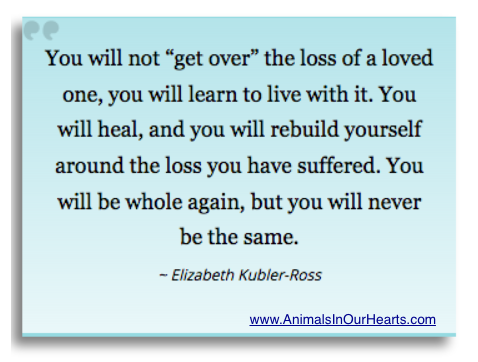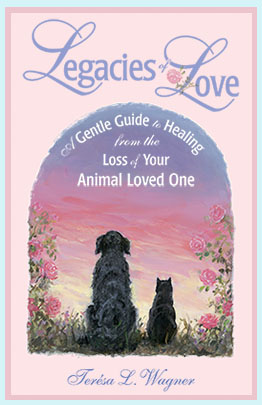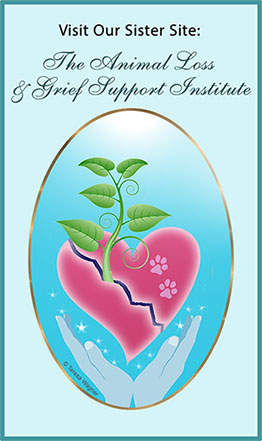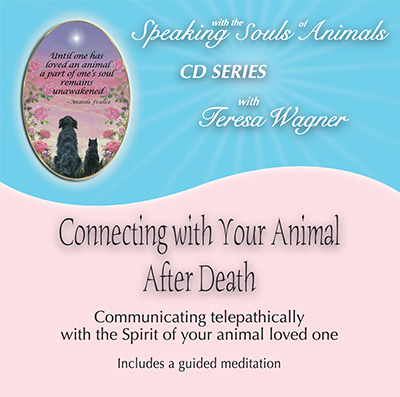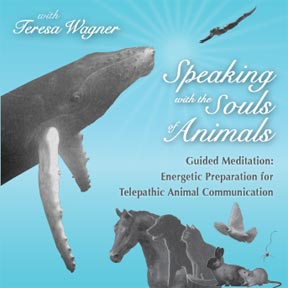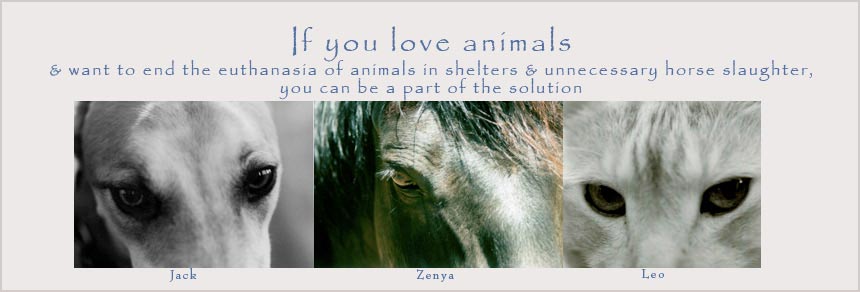Pet Loss Grief Support
Grieving Choices: Deny, Cope or Heal
When we lose a beloved animal our heart feels broken into a thousand pieces. There are three very different ways we can deal with this heartache and pain. I like to think of these as choices about how we respond to loss, though many of us usually respond unconsciously rather than consciously to emotional pain. As you read about these choices, see if you can identify your typical ways of dealing with grief, and if there is anything you may want to change or shift.
One choice is to deny the significance of our loss, to bury our intense emotions ~ repressing them, pretending there is no emotional work to be done. When we're in denial our understandable goal is to not have overwhelming feelings. Denial means that we pretend, even to ourselves, that an emotional crisis is not going on. We might do this because we have no past experience or skill in successfully tolerating and healing strong emotions, or perhaps because in our family or culture it has not been socially acceptable to openly mourn, especially for an animal. So people in denial can appear to be unfeeling, or appear to not be grieving, when actually they may be unaware of their feelings. Denial can take the form of rationalizing or intellectualizing our loss, sometimes taking on the belief of others that "this is not the end of the world, after all, it was just a pet." Without a support system of others who love animals as much as we do, it can be hard to feel that it is safe enough, or acceptable, to express our intense grief. Yet for someone who has loved their animal profoundly, denial simply doesn't work. It might temporarily mean escaping overwhelming pain, but suppressed emotions always return. They may return when we experience our next loss, giving us the challenge of multiple losses to deal with and grieve. Initially denied feelings often return with distortion, sometimes in unexpected, seemingly unrelated, or misplaced ways ~ such as a short temper, diminished ability to commit fully in relationships, burnout, depression, or anxiety. Sometimes emotions will express themselves through physical symptoms. When we don't listen to our emotions, our bodies will often cry out.
If you feel you are in denial, read the Twelve Ideas on Coping and Finding Comfort section to search for some strategies of coping that feel safe and appropriate for you as you are grieving the loss of your pet. Also, see our Pet Loss Support Resources section on flower essences to read about essences that can help us safely open up to our feelings.
A second choice we have to deal with our loss is to cope. Coping means we find ways to continue to function in our everyday lives despite our pain ~ we show up for work, we carry out our normal daily routines, we pull ourselves up by our bootstraps enough to survive, we go on... all the while acknowledging, not denying, that we are going through a very difficult time. When we choose coping as our predominant way of dealing with grief our primary goal is to not break down and fall apart. When we cope we experience much more stress than when we're in denial ~ because we feel our pain ~ and yet at the same time we want desperately to stop it. We're aware of our feelings but want to squelch or suppress them, not accept them. People who cope find ways to escape the overwhelming feelings so they can continue their lives without disruption. Some of these, if taken to an extreme, might have negative consequences such as overeating, drinking, or taking mood altering drugs. Other "coping escapes" can help us find both temporary release from the pain while also adding something positive to our days ~ taking a walk in nature, being with a friend, animal or human, venting our feelings at a support group, going out to dinner with a friend or loved one, watching a movie, working out, or whatever it is that makes us feel relaxed and OK, even if temporarily. Coping skills are important and necessary competencies to weather any crisis. Coping keeps us surviving, but it still feels like a struggle and it's stressful. Thankfully, coping and denial are not our only options.
Our third option in responding to grief is to choose to fully heal. Webster's dictionary describes healing as "restoring to wholeness." If we choose to heal when we lose a beloved animal, it means that our goal is to not merely cope, but to accept what is, to seek peacefulness and serenity about what cannot be changed. When we merely cope we keep on living but pay for it with the stress and tension which is part of resisting what is. When we choose healing, we accept that loss and pain are part of life, that overwhelming feelings are part of life. We learn to surrender to them and trust that we will not only survive, but will have opportunities to grow, learn and even transform from doing so. Authors Stephen Levine and Bernie Siegel in their best selling books about death, dying, and healing talk about how healing from a life threatening illness does not necessarily mean not dying. They describe healing as facing our most important unfinished business and issues in life and coming to peace about them. True healing from the loss of our beloved animals means that we face and complete any unfinished feelings of guilt (so common when we question what more we could have done), or feelings of resentment and anger (directed perhaps at others we felt could have done more for our animal or could have supported us in a better way). Following the path of healing also means we are simply willing to feel all of our feelings ~ not just talk about or intellectualize them, but really experience them, allowing them to live their course and leave. When we cope we are aware of our emotions but try hard to squelch them. When we are only coping we are usually still resisting what is. It is this resistance which causes so much suffering. When we choose the path of healing we are aware of our emotions, learn to accept them, and eventually release them.
Taking the healing stance in response to painful loss assumes that there still will be times when to keep functioning in the world we must keep our emotions in check. Sometimes we may temporarily put our feelings on hold because we are too exhausted for more healing work, or because we simply can't sob and drive or whatever at the same time. This is as it should be. But on the healing path this is done consciously, while on the coping path it is done unconsciously and is not alternated with attempts to really resolve our feelings.
Everyone, every single one of us who loves our companion animals will experience losing them. That we will experience this is a fact. Our reaction to our loss is our grief ~ our emotional response. That we will feel pain is also an inescapable fact. But what is our choice, not an automatic response, is whether or not to pour energy into attempts of reconciling our grief, to work toward true healing. Loss and the accompanying grief is something we all experience, but healing happens only through conscious choice. So what does healing look like?
Healing from grief is not an event, it's a process. It's a choice to move beyond denial or mere coping or symptom management to accept the crisis of loss and to use it to grow. It means we are learning to:
-
Draw sustenance from the meaning and purpose of the relationship with the beloved animal we have lost
-
Accept and face strong, powerful emotions, rather than avoid them
-
Come to terms with any anger or guilt surrounding our loss
-
Open ourselves to serenity and acceptance, along with our anguish and sorrow
-
Find ways to express and eventually let go of painful emotions
-
Cherish the gifts of love and other learning we exchanged with our animals and integrate these into our way of being, into our daily lives. These are the legacies of love which transcend physical death.
For more support, you may want to explore the series of class designed specifically for people who are grieving the loss of beloved animals classes:
http://pet-loss-grief-counseling-certification.com/pet-loss-grief-support-classes/#individuals
